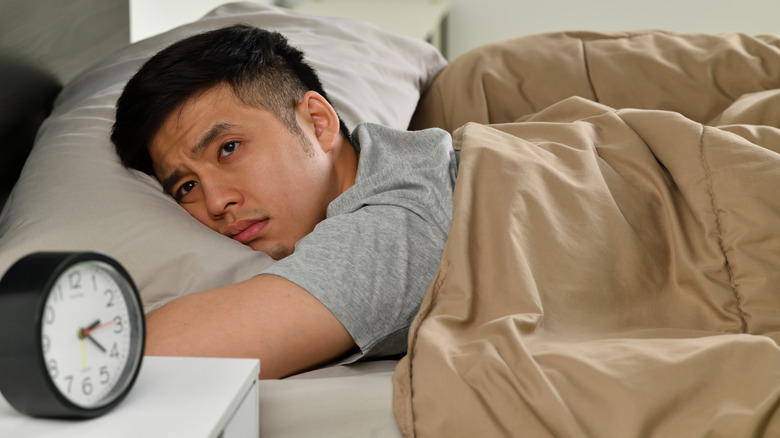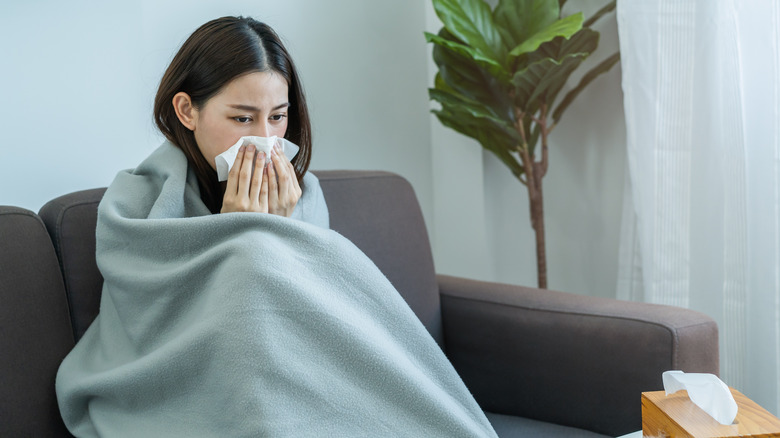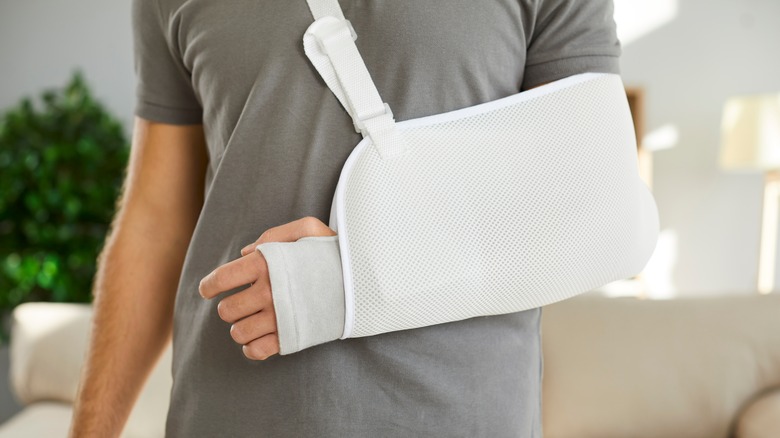What Happens To Your Body When You Work Too Much
Do you feel like the walking dead as your long days on the job sap your energy and cloud your brain? Studies show you're the norm in today's economy. A 2014 Gallup survey revealed the average working week in the U.S. is nearly a full day longer than the so-called standard of 40 hours — and 40% of employees and gig workers say they log in an astounding 60 hours in a week. Day in and day out, warns the World Health Organization, these excessively long shifts can have profound health consequences. The agency's 2021 report found that routinely clocking in over 55 hours on the job raises the risks of having a stroke by 35% and dying from heart disease by 17% (via NPR). And worldwide, death by overwork killed an estimated 745,000 people in a single year.
Okay, you might think, but what about working from home? If you're part of the 25% of Americans who began working exclusively from home in 2021, you may figure a home office should balance things out a bit. Well, maybe or maybe not. Working from home has its perks — like cutting out daily commutes — but surprisingly it also increases the average workday by 2.5 hours, according to CNN, and made working nights and weekends the new standard.
It's not always easy to make ends meet and cope with the stress of corporate demands, but working too much can have devastating consequences for your body.
Your healthy diet falls by the wayside
Unless you have incredible willpower or a long history of healthy eating, simply coping with the stress or monotony of long workdays may lead you down a sordid path of junk food and late-night binges (via Cleveland Clinic). Whether you're in an office setting or at home as a remote employee, don't be surprised to find yourself snacking more times than you'd care to admit on cookies, chips, crackers, and other highly processed snacks to get you through the day. It's a trap that many of us fall into when burning the candle at both ends. Unhealthy routines are easy to start when you're under the pressure of deadlines and lack of sleep.
If daily stress is your trigger, this can actually change your body's metabolic response to high-fat meals, as a 2015 study in Biological Psychiatry found, adding an extra 11 pounds per year to your frame. Unfortunately, the body can't distinguish why you're stressed — it automatically assumes a fight-or-flight mode and thinks you need fuel to fight whatever's disturbing you. So the stress hormone cortisol kicks in and, as the Cleveland Clinic explains, suddenly you're craving all the high-fat, sugary, salty, and fatty foods in your pantry.
You're hardly sleeping
Do you like to boast to friends that you don't need or have time for much sleep? "Especially in the tech industry, you hear people brag, 'I only got three hours of sleep' or 'I pulled an all-nighter.' It's the whole 'sleep when I'm dead, put in the hours' thing," Jason Fried, co-founder and CEO of U.S. software company Basecamp, told the BBC. "It's kind of gross — this idea that you 'need' to work so much, and that's the thing that'll get you ahead — putting in ridiculous hours. No one has the stamina or mental capacity to do 14 hours of work."
It's been proven in studies time and again that adequate sleep is not just a luxury — it's a necessity just like eating and breathing. Sleep affects nearly every system in the body, and a lack of it increases your risk of everything from diabetes to depression, warns the National Institute of Neurological Disorders and Stroke. While there's no across-the-board magic number, it's recognized that most adults should get about seven to nine hours of shut-eye on a regular basis, according to WebMD.
Your blood pressure is rising
You've put in regular overtime for years, but you're not worried about blood pressure. Why? Your reading is always right on the money during your annual physical. So no problems, right? Well, perhaps. There's something called masked hypertension, but it doesn't get talked about all that much.
With masked hypertension, your blood pressure runs high most of the day but appears normal by the time you get to the doctor's office. It's the opposite of the more well-known white-coat syndrome. While up to 30% of the U.S. adult population has masked hypertension, according to the American Heart Association, the risk becomes much higher with longer workweeks. AHA's study of 3,500 white-collar employees demonstrated that clocking in 49 or more hours a week raises the chances of masked hypertension by 70%.
"People should be aware that long work hours might affect their heart health, and if they're working long hours, they should ask their doctors about checking their blood pressure over time with a wearable monitor," Xavier Trudel, the study's lead author and an assistant professor in social and preventive medicine at Laval University in Quebec, revealed in a statement (via Reuters). "We've previously shown that over five years, about one in five people with masked hypertension never showed high blood pressure in a clinical setting, potentially delaying diagnosis and treatment."
You feel depressed
Is the mere thought of Monday morning at the office making you feel gloomy and stressed out? If this sounds like you, you're not alone. Crushing workloads, micromanaging bosses, and a company culture that rewards and expects employees to take projects home and be available at all hours can drive even the most conscientious employee into a state of despair. "Employees who feel they're already working at full capacity can slip into depression, particularly if they don't feel their boss is approachable," reports the Houston Chronicle.
Even transitioning to a fully remote job doesn't necessarily solve the problem. Such a position may have the appearance of more flexibility, but the opposite can actually be true in work-from-home situations. In some cases, it may just provide you the "privilege" of working weekends and putting in even longer hours, without the benefit of office camaraderie or receiving additional compensation for the extra hours. As noted in a 2021 research article and in multiple studies, all of these factors can easily trigger feelings of isolation and depression.
You're turning to booze to cope
Human beings cope with work stressors in many different ways. Some may choose to take up a hobby, binge-watch TV programs, or blow off steam by playing hours of video games. For others, though, it may mean hitting the bars after work or unwinding with a few glasses of wine at home. Although there's nothing wrong with the occasional drink, alcohol dependence is another thing entirely.
"If you rely on alcohol for happiness and pleasure, even numbing the stress, then that can actually cause significant problems down the road," Denise Graham, a counselor at the Cleveland Clinic's Alcohol and Drug Recovery Center, told the Cleveland Clinic. "You're not learning how to cope with things as they are right now. You're not learning to cope in healthy ways."
Alcohol increases dopamine levels and at the same time slows brain functioning, explains Psychology Today. As soon as the effects wear off though, the dopamine levels return to normal. So to get that same feeling of euphoria and reward, the urge to take another drink may be very strong. And over time, it takes more alcohol to achieve the same mood-boosting effect. It's a vicious cycle that's best avoided, as a pattern of drinking for stress relief can lead to addiction.
Your hair is falling out
It might not be your imagination that the long hours you spend on the job are taking a toll on your once-full head of hair. Most of us already know that unrelenting stress doesn't do our bodies any good. Now we can chalk up one more thing we don't like about being overworked: hair loss.
When researchers from the Sungkyunkwan University School of Medicine in Seoul, Korea, analyzed data from 13,000 men working at least 52 hours a week, they found something very interesting. According to their study, those putting in the long hours, who were all in their 20s and 30s, were twice as likely to develop alopecia than their counterparts who worked fewer hours. "We can cautiously assume the relationship between long working hours and the development of alopecia is likely to be mediated by job-related stress," the lead study author, Dr. Kyung-Hun Son noted.
Alopecia is an autoimmune condition usually causing patchy hair loss. Sometimes the hair can grow back, according to WebMD, but there is currently no cure.
Your body has more aches and pains
It's not just your imagination that working around the clock has literally been a pain in your you-know-what. It's probably also a pain your head, and neck, and back. Whether your job requires near-endless hours of standing or sitting, many studies, including one published in the Annals of Occupational and Environmental Medicine, show that the more hours you repeat a task, the greater odds you'll have in getting musculoskeletal problems.
Prevention is the key to heading off these problems before they start, including adjusting workspaces to be more ergonomic, strengthening your body's core through exercise, and taking frequent work breaks to stretch and walk (via Entrepreneur).
"Without the usual distractions of work, people find themselves sitting for 3-4 hours or more without getting up," physical therapist Julie Larson told the health care organization Providence. "That extended sitting leads to poor posture, which can ultimately lead to pain."
You're neglecting relationships
When you spend so many hours on the job that you neglect the most important people in your life, it's a good time to make a change. "If you're always working or heavily stressed, you may not be able to give your spouse, children or friends the time they need," the Houston Chronicle reported.
The top two job stressors cited by employees in the 2021 Work and Well-being Survey by the American Psychological Association were low salaries and long hours. Prioritizing the mental health of the workforce was noted as very important to employees, such as flexible hours and encouragement to use paid time off.
"A healthy work-life balance will mean different things to us all," says the Mental Health Foundation, U.K.'s leading charity for mental health. "It's not so much about splitting your time 50/50 between work and leisure but making sure you feel fulfilled and content in both areas of your life."
You're not exercising
Ending your workday by going straight from your computer to your comfy couch for a night of TV surfing may seem like an attractive way to end your day, but it's eventually going to catch up with you. Not getting any exercise on a regular basis comes at a high cost to health, according to the CDC. Even if you have no other risk factors, the agency warns, a couch potato lifestyle increases your likelihood for obesity, high blood pressure, high cholesterol, and type 2 diabetes.
Even just two weeks of inactivity can negatively impact your muscle mass, according to a 2015 study in the Journal of Rehabilitation Medicine. Carving out time before or after work for a regular exercise routine is one of the best things you can do for your health. The Mayo Clinic recommends at least 150 minutes of moderate aerobic activity or 75 minutes of vigorous aerobic activity per week for healthy adults. The main takeaway, though, is to simply get started. As exercise physiologist Neal Pire told Everyday Health, "Any time or form of exercise is better than none, whether it's 1, 5, or 30 minutes."
You feel rundown and sick
It's not just a coincidence when you feel rundown after a period of stress. Stress actually impacts your immune system, making you more prone to things like hives, headaches, heartburn, nausea, and yes, the common cold. "When people are stressed, they get sick. It could be a cold or cold sores, which pop up because the immune system can't suppress the virus," Dr. Shanna Levine, a primary care physician based in New York City, told Reader's Digest (via Insider).
Ideally, logging out of your computer at the end of a workday would also mean shutting off all the stress that your workday caused. But that's just not how things work for most people. As the American Psychological Association points out, all that mental strain felt at work can manifest into real physical issues that put a long-term drain on the body's defenses.
"When we are repeatedly flooded with stress hormones, it impacts our cognitive function, ability to make decisions and think creatively, and our entire body physiology," Dr. Michelle Dossett, an assistant professor of medicine at UC Davis School of Medicine in Sacramento, told Everyday Health. Overwork leads to stress, plain and simple. So if you're finding your unmanageable workload is actually making you physically sick, it's time to slow down before you wind up in a hospital bed. It's time to reprioritize your life.
You forget things
When on-the-job stress becomes too much to bear, you may hit a wall called burnout. And it's not a pretty thing. Burnout is something like depression and it can pack a wallop, slamming you with a long list of ailments including insomnia, anxiety attacks, body aches, and, yes, memory problems, according to the Association for Psychological Science.
Missing appointments, making errors, and experiencing that dull feeling of forgetfulness are some of the symptoms of burnout (via Fortune). Exhaustion and feeling disconnected from your job are additional common signs.
One of the best things you can do to beat job stress is to stay ahead of it. For a few minutes each day, give your brain some true downtime. That doesn't mean picking up a book, watching TV, or calling up a friend — those types of activities require too much processing. No, the Cleveland Clinic says letting your mind "wander" is the best medicine. This means doing mindless things like daydreaming, vacuuming, or even some weeding in your garden. "When you take breaks, you can solve problems in fresher ways than you could if you just kept your nose to the grindstone," said Cleveland Clinic psychologist Scott Bea. "Our brains are like any machine: They need a rest."
You're more irritable
A high-pressure job with a constant grind of long hours can leave you emotionally drained inside and outside of work. The sarcastic comebacks and irritation you display on the job are likely a cumulation of sleepless nights, bad eating, and feelings of being out of control. Maybe you used to love your job, but new company policies, or a new boss, have exhausted you emotionally and physically. You know you need to make a change, but the first step is hard.
"Feeling down about your job can set you up for a self-perpetuating cycle by taking a negative toll on the way you think and the way you behave," Amy Morin, author of "Things Mentally Strong People Don't Do" told Insider. "The more you experience negative thoughts and unproductive behavior, the worse you'll feel."
Taking control of your life again can be achieved in many different ways, from switching jobs (if that's an option) to meeting with a therapist. Focusing on improving and filling your personal life with yoga, meditation, or mini-getaways, can also be helpful, according to Healthline. The important thing is to start with one positive change, however small, and build on it from there to reclaim your well-being and happiness.
You've become accident-prone
If you're burning the midnight oil, it's only a matter of time before your fatigue catches up with you. A body needs rest; if you're working extended shifts or irregular schedules, your sleep deprivation and foggy brain can create the perfect storm for accidents. In fact, according to one study that appeared in the journal of Occupational & Environmental Medicine, nearly 11,000 working U.S. adults experienced significantly higher injury rates when they routinely worked extended hours. Your capacity to perform is impaired when you don't get enough sleep — much in the same way as if you were drunk, reports the BBC.
"If you're not used to working long hours, that can create more of the stress and fatigue which in turn creates an environment where injuries and accidents can happen," Allard Dembe, a former professor at the Center for Health Policy and Research at the University of Massachusetts Medical School, told The New York Times.
You're less productive
In American workplace culture, where "living to work" is revered and seen as the mark of a productive employee, the evidence actually points to the opposite being true. Those "work martyrs," reports CNBC, don't actually get that much accomplished after 50 hours on the job. Fatigue, excessive multitasking, skipping vacations, or working through your days off all contribute to a chronically tired workforce that'll eventually lead to burnout. Studies abound, such as a national sample published in the Journal of Occupational Health Psychology, which demonstrates that working long nights and overtime negatively impact the well-being of employees.
"Hard work is not a bad thing and there is nothing wrong with being proud of the hours you work and the effort you expend," according to Entrepreneur. "The danger is prioritizing the amount of work you do rather than the quality of work you do and your health."















